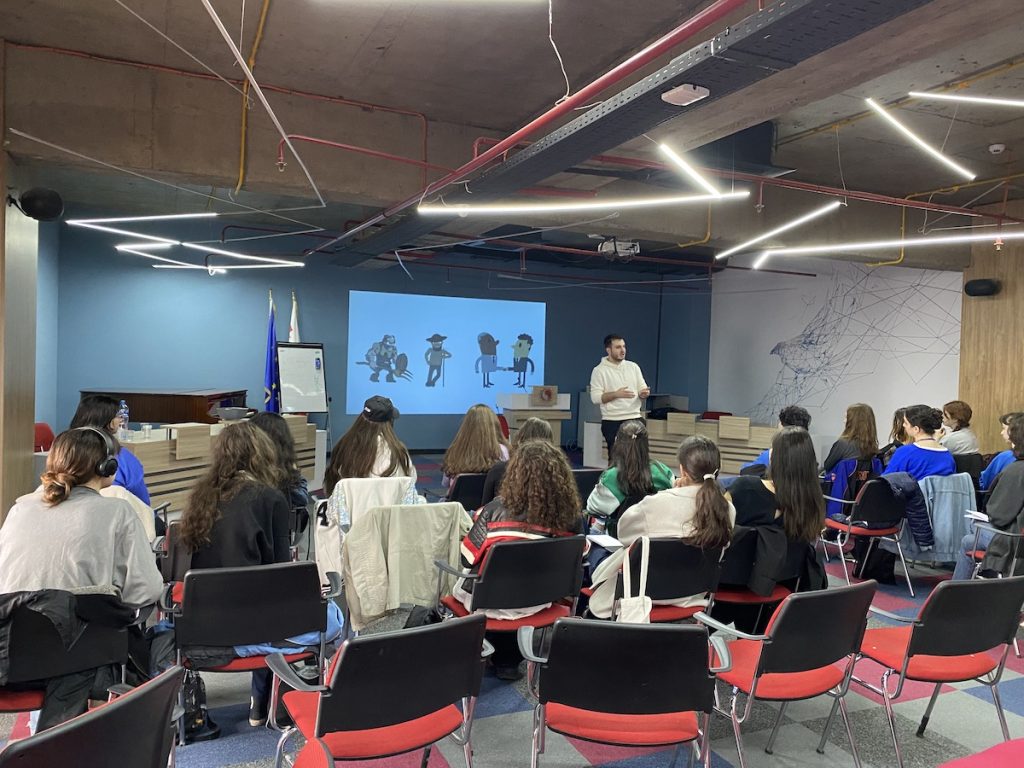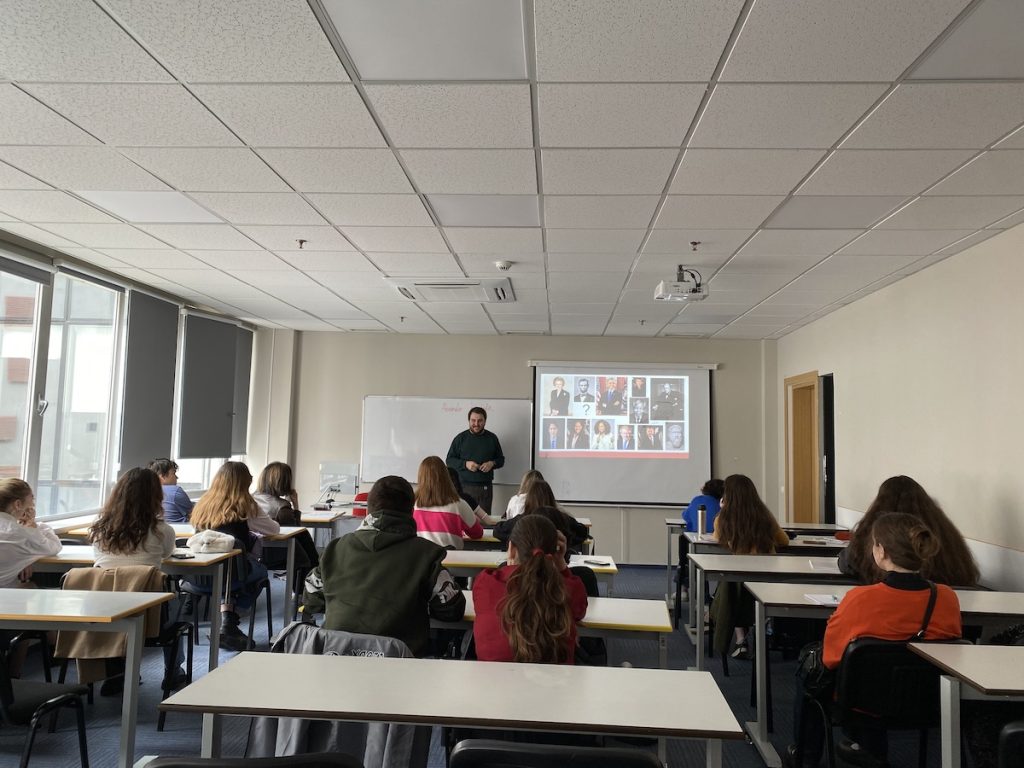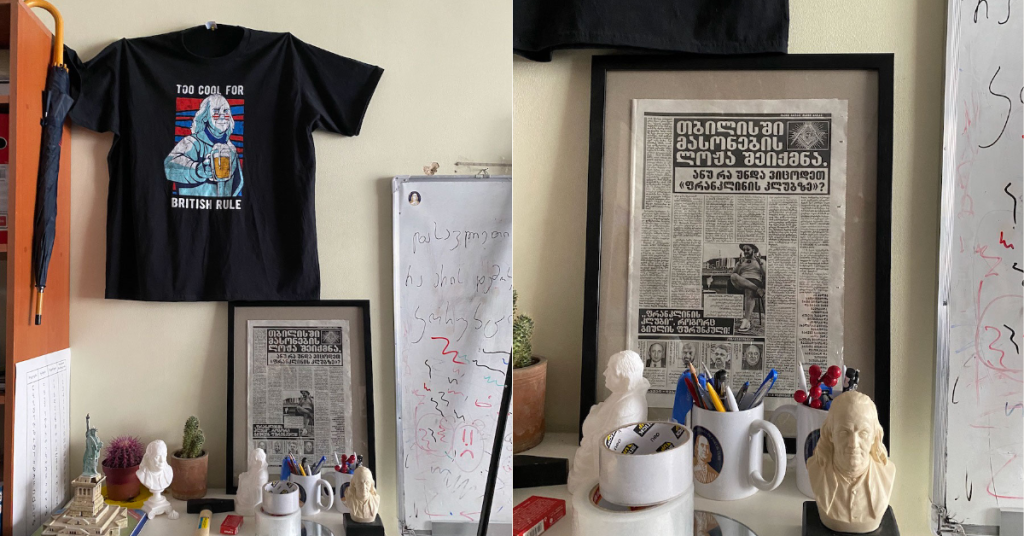What is the "Franklin Club" in Tbilisi, and why is the government unhappy about it?
Franklin Club in Tbilisi
Gen Z or “zoomers” became the face of large-scale protests that took place in Tbilisi on March 7-9. Even high school students came out to rallies against the adoption of a bill similar to the Russian law “On Foreign Agents”. For many young people under the age of 26, this was the first protest in their lives. To everyone’s surprise, the generation, which until now was considered passive and indifferent to processes taking place in the country, showed amazing courage even when the rallies were dispersed with water cannons and tear gas. A young girl danced under running water and video of young people dancing to the sound of sirens have become symbols of the protests.
The ruling Georgian Dream party was forced to withdraw the bill on foreign agents. Many believe it was owing to the bravery of the youth.
However, just a few days after these concessions, the Georgian Dream went on the attack and engaged in PR against the protest youth.
Extremist groups, anarchists, provocateurs, Satan worshipers — this is an incomplete list of epithets that the prime minister, the chairman of the ruling party, and other government officials have slapped on these young people.
The country’s leadership singles out the Franklin Club as “misleading” the young. Authorities say the club, where students receive non-formal education, “recruits young people.”
JAMnews asked what the Franklin Club is, what is going on there, and how the youth are “brainwashed” there.
__________________________________
“What is the connection between Brad Pitt, Margaret Thatcher and Barack Obama?” — Photographs of various famous people are displayed on the wall. Students aged 16-17 sitting in the audience are trying to answer this question from lecturer Alexander Zibzibadze.
“They were all well-known and experienced debaters,” Alexander himself answers the question, and tells the kids what it means to be a good debater and what makes these people special.
Lecturer Giorgi Andronikashvili starts the stopwatch in the second auditorium. Adults are divided into two teams and compete with each other in a debate.
A hotly debated topic was chosen: should military service in Georgia be compulsory.
In the third auditorium, a lecture by David Mumladze is taking place, who tells students about the difference between Fascism and Nazism.

All this takes place at the Franklin Academy, which is one of the projects of the Franklin Club.
The existence of this club was not known to many in Georgia until early March, when Prime Minister Garibashvili called the young people who participated in the March 7-9 demonstrations Satanists who were brainwashed by special lectures and literature at the Franklin Club:
He also called these youth anarchists who were “instructed to enter into a direct confrontation with the police.”
Inventing jokes about the Prime Minister’s statements has recently become one of the main entertainments of the teachers and students at the Franklin Club.
“Now we are much more popular than before,” says 22-year-old David Mumladze, head of the Franklin Academy. “Many media have given us airtime, the number of subscribers has increased, the number of people who want to register has almost doubled.”
What is the Franklin Club?
The Franklin Club in Tbilisi is an organization founded by nineteen young people in 2020, after the Georgian Dream party won a parliamentary majority for the third time in elections.
“We were very disappointed and thought it would be nice to have an organization that would provide people with information on classic liberal topics,” Alexander Zibzibadze, 29, one of the founders of the Franklin Club, says.

The club works on various media projects and publications, but the club’s largest and most ambitious project is the Franklin Academy, which has already registered more than a thousand students.
The main function of the academy is to disseminate knowledge and develop critical thinking among young people.
Both students and high school students can register as listeners. Lectures usually take place on weekends. Education for schoolchildren is free, for students a full month costs 100 lari [about $40].
The first level is a general education course, where seven subjects are studied in one month. At the second level, the student chooses a specific direction — for example, economics, law, etc. The third stage involves a three-month practicum in which young people apply what they have learned in practice.
After passing all three levels, that is, after a few months, students receive a general basic education in the field of economics, politics, international relations, business, management, debate, law and art.
Young people also learn how to write business projects, meet artists, directors and photographers, prepare presentations and speeches, etc.
In total, the academy has eleven groups of up to 320 students working in parallel to each other.
“We believe that it is very important for a person to know about their fundamental rights, understand the basics of economics, be able to think critically and be in contact with different areas of art. It is this basic education that we give to 16-17-year-olds whom the prime minister calls anarchists,” David Mumladze says.
The faces of the club
Mariam, 17, heard about Franklin Club from a friend.
“When I got here, I found that I could talk about topics that we never covered at school, like law or political ideologies. I knew about all this only by hearsay, but here I discovered a new world where we can thoughtfully discuss various important topics.”
Mariami studies and works at the club, dealing with issues of organization.
“Succeeding in all this is not difficult. Coming here after studying, attending lectures, working is, on the contrary, relaxing. The material studied here helps me a lot in preparing for the exams. I’m thinking of going to law school.”
“Here you never stand in one place. You meet interesting, smart and thoughtful people, make new friends. Here every day is interesting, and you are constantly developing.”
Nini, 16, was one of the first students of the Franklin Club:
“Before coming here I had many complexes, it was difficult for me to communicate with people. And I overcame all these complexes with the help of Franklin. I feel like my level of education has improved. Here we also learn how to deal with stress.”

The March protest against the law on foreign agents was 18-year-old Zuki’s first. On the night of March 8, he was on the front line and fell under the batons of the police.
“Go away or I’ll hit you. Not even a second passed, during this time it was impossible even to move, as a blow fell on me. And so hard that I jumped back out of inertia and pulled her. When I woke up, there were five people on top of me. I asked for help, I couldn’t breathe. My friends pulled me out. They tried to find water and give me a drink. We didn’t have Molotov cocktails, we didn’t hurt anyone, we were just protesting the biggest mistake.”
According to Zuki, the prime minister’s attacks on Franklin Club are nothing more than fear-mongering
“Young people always bring change, and that’s what our prime minister is afraid of.”
Zuki is in the twelfth grade. And although there are interesting electives at school, he says that at the Franklin Club he received a completely different level of education, more useful and thorough. Zuki has passed all the levels and still attends various lectures.
“Unlike school, here we are not locked up. I have friendly relations with the lecturers, and, most importantly, they find an interesting way to interact with us. Here we learn to think outside the box. This is a European education that is focused on the development of young people. The Prime Minister is struggling with all this, despite the fact that he himself was educated in France, and his son is also studying in America.”
Why Franklin?
“What does Franklin have to do with Georgia?” the Prime Minister asked, speaking of the Franklin Club.
“We didn’t want to be too banal, but on the other hand, we wanted to choose a catchy name. Benjamin Franklin was a classic liberal personality, and his biography has much in common with the biography of our greatest liberal and thinker, Ilya Chavchavadze,” Alexander Zibzibadze says.
According to Alexander, the government’s attempt to denigrate the Franklin Club may have two reasons — after a major defeat with the law on foreign agents, the government is trying to switch attention to other topics, look for enemies and not talk about their own misdeeds.
“The name is not Georgian, it is associated with America, and this was used by pro-Russian people as an automatic basis for aggression.”
Also, according to Alexander, any space where many young people gather, discuss various issues and receive education is dangerous for the authorities.
“State propaganda cannot penetrate into such spaces, people here are critical of both the government and the opposition, so such places are dangerous for them. And most importantly, Generation Z is studying with us, who will actively participate in protests.”
According to David Mumladze, the attack of pro-government media on the club began at the end of last year. The propaganda newspaper “Asaval-Dasavali” published an article under the heading “Masonic Lodge Created in Tbilisi”. Shortly thereafter, Imedi TV aired a story where members of the Franklin Club were called the heirs of Kmara, a youth movement that participated in the Rose Revolution in 2003.

“Propaganda attacks from the government have happened before, so we weren’t too surprised, although we really didn’t expect such a statement from the prime minister,” Giorgi Andronikashvili, a teacher at the Franklin Club, says.
“Obviously this is connected with the rallies, but the Club has not done anything in this direction. Everyone who was at the rally made this decision on their own.”
“[Despite the slander of the government] attendance has not decreased, but increased significantly. We tried to convey the correct information to the audience and asked Imedi TV to give us airtime, but so far there has been no response.”
After rumors surrounding the club, the team decided to leave the University of Georgia building so that this private institution would not come under attack.
The University of Georgia has been one of the club’s main partners since its inception, along with several international donors. On weekends, the university provided its premises to the academy free of charge and financed the education of schoolchildren.
“Through us, they also struck at the university. They labeled the students as a member of the Franklin Club, and therefore we made the difficult but necessary decision to leave the walls of the university,” David Mumladze says.
According to him, the club will take a break to think about where and how to carry on:
“Now we have a lot of supporters. Many organizations contact us and offer cooperation. We will take a short break and then start working with new donors.”



















